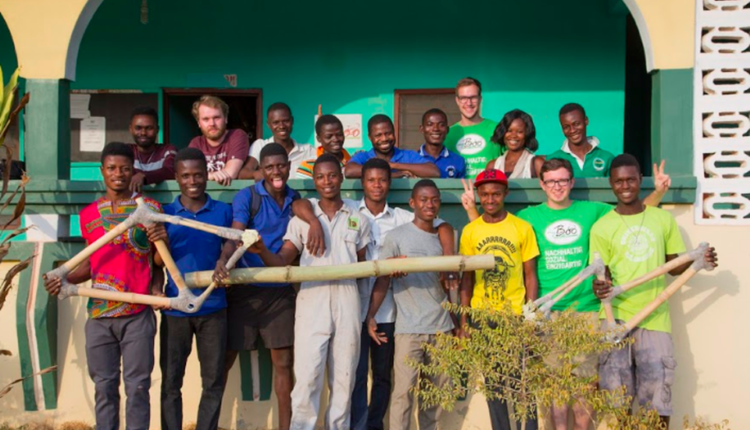Bikes – not the kind with an engine – are fast becoming a status symbol, says Maximilian Schay, founder of German start-up MyBoo.
“People really care about their bikes, and they’ve become something more than just getting from A to B. It’s about lifestyle, and the way bikes are produced is become more important.”
In 2012, Schay started a business with his then classmate Jonas Stolzke, while they were studying economics at university.
“We dreamt of founding a company that would do good. A good friend of mine had sent me a picture of a bike made out of bamboo in Central Ghana, and I loved it – even though it wasn’t really something we thought we could sell in Europe. But we saw potential to use the bamboo, and create fair paid jobs too. Normally, companies would just export the raw materials, but we wanted to have the core of our production in Ghana.”
Schay is proud to stand apart from other bicycle brands, especially those offering individually manufactured bikes, which he says are the company’s main competitors.
“Most of the bicycle brands get their frames from Asia and use parts from the same brands that all the others do. We are producing the frames in Ghana, a country that is not famous for their bicycle production. Also the fact that we are creating fair paid jobs, investing into a school and scholarships and using a good resource for our frames is at the core of our product, and is differentiating us from nearly all other brands.”
The company now has 35 frame builders in Ghana, and a team of 20 in Germany. The Ghanians build the frames using bamboo and they are shipped by sea to Germany and assembled in the factory.
But the pair didn’t stop there. In 2016, they started building a school for several hundred children that will be opened this summer, and they have partnered with UNICEF to launch a bike to school program in the Ashanti region.
The company has brought jobs to the Ashanti region, as well as providing scholarships to students, and Schay says it is important to show it is possible to finance social projects through business, rather than donations.
Since inception, the company has sold more than 2,000 bikes in Europe, predominantly in Germany and the Netherlands, and the co-founders are now looking to expand their reach to the UK and the US. The company has three bike stores across Germany, and currently has an annual profit of around €50,000 ($56,000).
“We want to show not only that bamboo is a great material for bike frames but establish bamboo as a normal material for bike frames on the market.”
However, it hasn’t been easy bringing the product to market. “Producing handmade bicycle frames out of a natural material in Central Ghana is not easy. We do not have constant electricity there and we started really from the scratch.
“In 2013 we have the support of a partner – the Yonso Project – to build the first small production facility and we trained the first 10 workers. It took a long time until we had reached the quality level we needed to sell bikes in Europe for prices between €1500 and €5000 ($1700 to $5700). We also had a lot of trouble with logistics in Ghana and the bureaucracy. Sometimes we had to wait days at the airport to get our goods out of the customs.”
“We also want to use our company to create a lot more jobs in Ghana and be a role model for other companies to change their way of doing business.
“And we want to see our school that we are building right now in a great condition in five years’ time and hopefully build some more in the coming years.” CREDIT: Lucy Sherriff, FORBES.
NB: The writer is a Journalist covering social business, environment and gender, with a focus on solutions-based journalism, through writing and film.


Comments are closed.